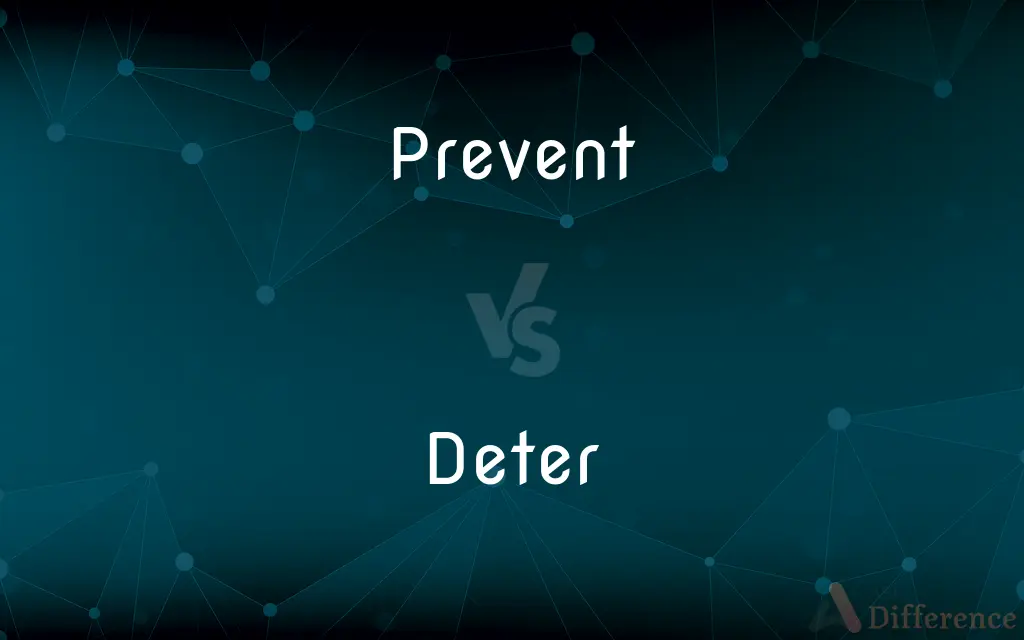Prevent vs. Deter — What's the Difference?
Edited by Tayyaba Rehman — By Maham Liaqat — Updated on April 29, 2024
Prevent involves stopping an action or event before it starts, while deter means to discourage actions through fear or doubt.

Difference Between Prevent and Deter
Table of Contents
ADVERTISEMENT
Key Differences
Prevent directly stops an event or action from occurring through intervention or control measures. In contrast, deter focuses on discouraging someone from acting in the first place by instilling fear, doubt, or other psychological barriers. Prevention is often seen in health and safety protocols, where specific actions are taken to ensure an incident doesn’t occur. Whereas, deterrence is commonly used in security and law enforcement, where the presence of penalties or surveillance acts as a discouragement.
Prevention methods are typically proactive and definitive, aiming to completely eliminate the chance of an event or behavior happening. On the other hand, deterrence can be seen as somewhat less certain, as it relies on influencing decision-making processes which can vary widely between individuals. Preventative measures might include vaccinations to stop the spread of disease, while deterrent measures could involve the threat of punishment to prevent crime.
The application of prevention is often tangible and can be directly observed, such as installing smoke alarms to prevent fires. In contrast, deterrence often operates on an intangible level, leveraging the psychology of fear or consequence to reduce the likelihood of unwanted actions. Preventative actions are designed to remove all opportunity for an event, whereas deterrence might not stop the determined individual but lowers the general incidence.
In terms of outcome, prevention ensures that the unwanted event does not occur at all. Whereas, deterrence reduces the likelihood of the event but does not guarantee its complete elimination. This makes prevention a more definitive approach compared to the more probabilistic nature of deterrence.
Comparison Chart
Definition
To stop something from happening altogether.
To discourage actions through fear or doubt.
ADVERTISEMENT
Focus
Elimination of possibility.
Reduction in likelihood.
Strategy
Direct intervention.
Psychological influence.
Certainty
High certainty of effect.
Variable certainty of effect.
Common Usage
Health and safety measures.
Security and legal systems.
Compare with Definitions
Prevent
To block an action or event through direct means.
The barrier was built to prevent flooding.
Deter
To use psychological or physical barriers to reduce the likelihood of an action.
Surveillance cameras deter shoplifting.
Prevent
To stop something from occurring by taking advance measures.
They prevent accidents by enforcing strict safety protocols.
Deter
To discourage someone from doing something through fear or doubt.
Harsh penalties deter potential offenders.
Prevent
To take preemptive action against potential problems.
Vaccinations prevent the spread of infectious diseases.
Deter
To create hesitation or reluctance through potential consequences.
The risk of fines deters speeding.
Prevent
To eliminate the possibility of an event.
Regular maintenance can prevent machine failure.
Deter
To reduce the incidence of certain behaviors by making them less appealing.
Higher taxes on cigarettes deter smoking.
Prevent
Keep (something) from happening
Action must be taken to prevent further accidents
Deter
To influence someone’s decision-making by highlighting negative outcomes.
Warning signs deter trespassing.
Prevent
To intervene in a process to ensure an event does not happen.
Firewalls are installed to prevent unauthorized access.
Deter
Discourage (someone) from doing something by instilling doubt or fear of the consequences
Only a health problem would deter him from seeking re-election
Prevent
(of God) go before (someone) with spiritual guidance and help.
Deter
To prevent or discourage from acting, as by means of fear or doubt
Threats that did not deter her from speaking out.
Skin chemicals that deter predators.
Prevent
To keep from happening; avert
Took steps to prevent the strike.
Deter
To prevent or discourage (an action or behavior)
Installed surveillance cameras to deter vandalism.
Prevent
To keep (a person or thing) from doing something; impede
Prevented us from winning.
Prevented the disease from spreading.
Deter
To make less likely or prevent from happening
Protocols to deter infection.
Prevent
To anticipate or counter in advance.
Deter
(transitive) To prevent something from happening.
Prevent
To come before; precede.
Deter
(transitive) To persuade someone not to do something; to discourage.
Their boss deterred them from both taking holidays at the same time, claiming he couldn't manage it all on his own.
Prevent
To present an obstacle
There will be a picnic if nothing prevents.
Deter
(transitive) To distract someone from something.
Prevent
(transitive) To stop (an outcome); to keep from (doing something).
I brush my teeth regularly to prevent tooth decay.
Deter
To prevent by fear; hence, to hinder or prevent from action by fear of consequences, or difficulty, risk, etc.
Potent enemies tempt and deter us from our duty.
My own face deters me from my glass.
Prevent
To take preventative measures.
Deter
Try to prevent; show opposition to;
We should discourage this practice among our youth
Prevent
To come before; to precede.
Deter
Turn away from by persuasion;
Negative campaigning will only dissuade people
Prevent
To outdo, surpass.
Prevent
To be beforehand with; to anticipate.
Prevent
To go before; to precede; hence, to go before as a guide; to direct.
We which are alive and remain unto the coming of the Lord shall not prevent them which are asleep.
We pray thee that thy grace may always prevent and follow us.
Then had I come, preventing Sheba's queen.
Prevent
To be beforehand with; to anticipate.
Their ready guilt preventing thy commands.
Prevent
To intercept; to hinder; to frustrate; to stop; to thwart.
Perhaps forestalling night prevented them.
Prevent
To come before the usual time.
Strawberries . . . will prevent and come early.
Prevent
Keep from happening or arising; have the effect of preventing;
My sense of tact forbids an honest answer
Prevent
Prevent from doing something or being in a certain state;
We must prevent the cancer from spreading
His snoring kept me from falling asleep
Keep the child from eating the marbles
Common Curiosities
How does deterrence work?
Deterrence works by instilling fear, doubt, or hesitation to reduce the likelihood of an action being taken.
Can deterrence always prevent an action?
No, deterrence reduces the likelihood but does not guarantee that an action will be completely prevented.
What are common methods of prevention?
Common methods include physical barriers, regulations, and safety measures.
Is prevention more effective than deterrence?
Effectiveness can vary; prevention directly stops events, making it definitive, whereas deterrence aims to reduce their likelihood.
What is an example of a preventive measure in public health?
Vaccinations are preventive measures that stop the spread of diseases.
What does it mean to prevent something?
To prevent something means taking proactive steps to ensure that an event or action does not occur at all.
How do societal norms deter unethical behavior?
Societal norms create a psychological barrier by associating negative social consequences with unethical behavior.
What is the psychological basis of deterrence?
The psychological basis of deterrence is influencing someone’s decision-making by emphasizing negative consequences.
Can prevention and deterrence be used together?
Yes, many systems use both prevention and deterrence strategies to enhance overall effectiveness.
How do laws deter crime?
Laws deter crime by establishing punishments that make the cost of committing the crime potentially outweigh the benefits.
Share Your Discovery

Previous Comparison
Deposit vs. Posit
Next Comparison
Ginger vs. OnionAuthor Spotlight
Written by
Maham LiaqatEdited by
Tayyaba RehmanTayyaba Rehman is a distinguished writer, currently serving as a primary contributor to askdifference.com. As a researcher in semantics and etymology, Tayyaba's passion for the complexity of languages and their distinctions has found a perfect home on the platform. Tayyaba delves into the intricacies of language, distinguishing between commonly confused words and phrases, thereby providing clarity for readers worldwide.














































